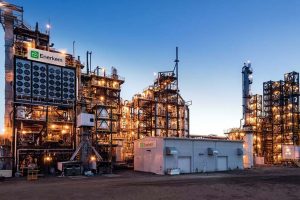
Gasification is a waste-to-energy process by which materials such as municipal solid waste are converted to synthetic gas, methanol or other fuel products. According to the study, titled “The Effects of Non-recycled Plastic (NRP) on Gasification: A Quantitative Assessment,” non-recycled plastics are a valuable feedstock for gasification.
“This study demonstrates that because carbon and hydrogen rich plastics have high energy content, there is tremendous potential to use technologies like gasification to convert these materials into fuels, chemicals, and other products,” researcher Marco Castaldi stated in a press release.
The research was funded by the American Chemistry Council, Plastics Industry Association and Canadian Plastics Industry Association. It was completed by the Earth Engineering Center at The City College of New York. The trials took place at a gasification facility in Edmonton.
The researchers focused on often-landfilled plastics. “Since there are practical limits on mechanical recycling, it is important to understand the environmental impacts of alternatives to landfill, such as gasification to methanol,” the report states.
For the trials, researchers used feedstock blends that included a range of plastic content, from 0 percent to 50 percent, mixed in with wood chips. The plastics came from residue from Edmonton’s materials recovery facility (MRF). They examined how increasing the percentage of plastics in the gasification feedstock mix would impact end-product yield, thermal efficiency of the process, and the volume of unuseable byproduct.
The study found positive results from adding plastics, with the results improving based on higher plastics content. With a 50 percent plastics mix, 80 percent more synthetic gas was produced than with a mix that didn’t include plastic, and only marginally more energy was required to process the mix. A mix with 50 percent plastics also produced up to 42 percent more methanol, the researchers found.
“The road to producing greater quantities of liquid fuels and chemicals from gasification is still evolving,” the researchers concluded. “Companies will need to optimize feed handling and process efficiencies. However, this study indicates that [non-recycled plastic] is a material stream that should be diverted from landfill because it offers significant benefits to the overall performance and product yield of gasification technologies.”
More stories about research
- New report explores the future of CPG packaging goals
- RIT researchers develop AI-based textile recycling system
- Researchers: Effective plastic treaty requires production cuts